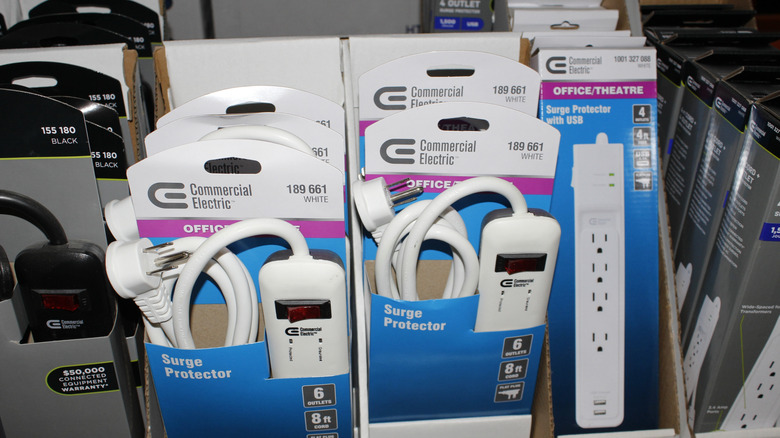Can High Voltage Damage Your Appliances? Here's The Truth
We may receive a commission on purchases made from links.
Many people assume that as long as appliances are plugged in and working, there's nothing to worry about. But a sudden spike in voltage can mess up your devices. Whether it's a power surge, unstable electricity, or a wiring issue, too much voltage can fry your favorite appliances and gadgets, and cost you a lot in surprise repairs or replacements.
What causes high voltage surges? One of the biggest culprits is power surges — sudden voltage spikes that happen when lightning strikes, there's a power outage, or the grid just fluctuates. When this happens, any plugged-in appliance can get hit with more power than it's built to handle. That can lead to overheating, circuit board failures, or even complete burnout. Another cause is faulty wiring. If your home's electrical system is old or not installed correctly, voltage fluctuations can gradually wear down your appliances over time.
When it comes to damage, not all voltage surges are catastrophic, but even minor ones can cause little annoyances like flickering screens, weird noises, or decreased efficiency. But in the worst-case scenario, high voltage can completely destroy an appliance. Things like microwaves, TVs, and computers are particularly vulnerable because they are linked to electrical or telecommunication wires. Even if a surge doesn't kill them immediately, repeated exposure can shorten their lifespan and make them break down more often.
How to protect your appliances from high voltage damage
First up, surge protectors. These handy gadgets absorb excess voltage and keep it from reaching your sensitive electronics. If you have expensive gear like a gaming setup, a high-end TV, or a work computer, investing in a good surge protector from HANYCONY is a no-brainer. For even better protection, consider a whole-house surge protector. Instead of protecting just one outlet, this gets installed at your main electrical panel and acts as a barrier against voltage spikes for your entire home. An Eaton whole home surge protector is a little pricier, but worth it if you want full coverage.
Don't forget about your home's wiring. Signs of old, damaged, or faulty wiring can cause major voltage swings, so it's a good idea to have an electrician check things out if you notice flickering lights, a burning smell near outlets, or appliances dying out of nowhere. A little maintenance can save you a lot of headaches down the road. And here's an easy trick — unplug appliances during thunderstorms or power outages. If they're not plugged in, they can't be affected by surges. Simple, but effective.
At the end of the day, taking a few precautions can save you from costly repairs and keep your appliances running smoothly for years. Understanding how voltage fluctuations work and setting up the right protective measures will help you avoid unexpected breakdowns and keep your home electronics safe and sound.

